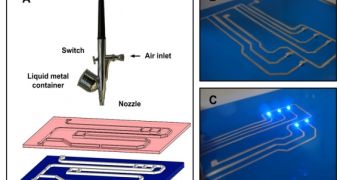There already are some flexible and curved gadgets up for sale, but true flexibility will only be attained when circuit board substrates achieve it. And lo and behold, they may have done so just this week.
Jing Liu and associates from the Technical Institute of Physics and Chemistry in Beijing have revealed a method through which liquid metal can be used as ink to “write” circuits on cotton, plastic, paper, rubber, cloth, glass, an ordinary leaf even.
Essentially, they have managed to adapt the inkjet printing process to print metal onto flexible, even rollable and foldable, substrates.
The liquid metal is an alloy made of indium and gallium (liquid at room temperature). An inkjet printer simply processes it as it would, well, ink.
The resulting fine spray of liquid metal droplets settle onto the surface of whatever is chosen from among the substrates mentioned above.
Said droplets oxidize very quickly, just from traveling through the air. The oxide then forms a surface layer on each drop that effectively insulates the rest, preventing oxidation from continuing.
It is for this reason that the metal actually adheres to the materials they are jetted onto: it's not the metal itself that sticks to them, but the oxide.
Any circuit pattern can be created, and easily too, either through moving the printer head over the substrate or by using a mask.
Add to that the fact that the technology is, ultimately, very cheap and simple to use and you have to wonder why it wasn't done before.
On that note, bringing it to the market should be an easy and quick matter. Glowing t-shirts, or clothing that accumulates power from movement and fuels our gadgets, should be an easy enough endeavor.
There is also no reason why small businesses and even consumers should be unable or disallowed to buy one of these printers as soon as they enter mass production. It would be like restricting the use of a normal printer after all.

 14 DAY TRIAL //
14 DAY TRIAL //